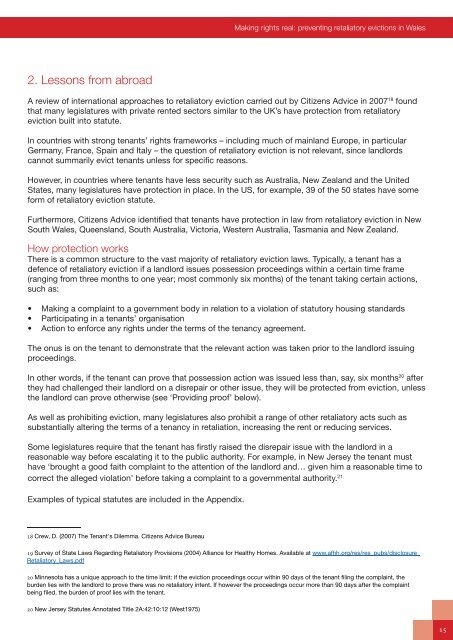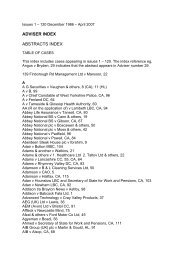Retaliatory eviction - Citizens Advice
Retaliatory eviction - Citizens Advice
Retaliatory eviction - Citizens Advice
Create successful ePaper yourself
Turn your PDF publications into a flip-book with our unique Google optimized e-Paper software.
Making rights real: preventing retaliatory <strong>eviction</strong>s in Wales2. Lessons from abroadA review of international approaches to retaliatory <strong>eviction</strong> carried out by <strong>Citizens</strong> <strong>Advice</strong> in 2007 18 foundthat many legislatures with private rented sectors similar to the UK’s have protection from retaliatory<strong>eviction</strong> built into statute.In countries with strong tenants’ rights frameworks – including much of mainland Europe, in particularGermany, France, Spain and Italy – the question of retaliatory <strong>eviction</strong> is not relevant, since landlordscannot summarily evict tenants unless for specific reasons.However, in countries where tenants have less security such as Australia, New Zealand and the UnitedStates, many legislatures have protection in place. In the US, for example, 39 of the 50 states have someform of retaliatory <strong>eviction</strong> statute.Furthermore, <strong>Citizens</strong> <strong>Advice</strong> identified that tenants have protection in law from retaliatory <strong>eviction</strong> in NewSouth Wales, Queensland, South Australia, Victoria, Western Australia, Tasmania and New Zealand.How protection worksThere is a common structure to the vast majority of retaliatory <strong>eviction</strong> laws. Typically, a tenant has adefence of retaliatory <strong>eviction</strong> if a landlord issues possession proceedings within a certain time frame(ranging from three months to one year; most commonly six months) of the tenant taking certain actions,such as:• Making a complaint to a government body in relation to a violation of statutory housing standards• Participating in a tenants’ organisation• Action to enforce any rights under the terms of the tenancy agreement.The onus is on the tenant to demonstrate that the relevant action was taken prior to the landlord issuingproceedings.In other words, if the tenant can prove that possession action was issued less than, say, six months 20 afterthey had challenged their landlord on a disrepair or other issue, they will be protected from <strong>eviction</strong>, unlessthe landlord can prove otherwise (see ‘Providing proof’ below).As well as prohibiting <strong>eviction</strong>, many legislatures also prohibit a range of other retaliatory acts such assubstantially altering the terms of a tenancy in retaliation, increasing the rent or reducing services.Some legislatures require that the tenant has firstly raised the disrepair issue with the landlord in areasonable way before escalating it to the public authority. For example, in New Jersey the tenant musthave ‘brought a good faith complaint to the attention of the landlord and… given him a reasonable time tocorrect the alleged violation’ before taking a complaint to a governmental authority. 21Examples of typical statutes are included in the Appendix.18 Crew, D. (2007) The Tenant's Dilemma. <strong>Citizens</strong> <strong>Advice</strong> Bureau19 Survey of State Laws Regarding <strong>Retaliatory</strong> Provisions (2004) Alliance for Healthy Homes. Available at www.afhh.org/res/res_pubs/disclosure_<strong>Retaliatory</strong>_Laws.pdf20 Minnesota has a unique approach to the time limit: if the <strong>eviction</strong> proceedings occur within 90 days of the tenant filing the complaint, theburden lies with the landlord to prove there was no retaliatory intent. If however the proceedings occur more than 90 days after the complaintbeing filed, the burden of proof lies with the tenant.20 New Jersey Statutes Annotated Title 2A:42:10:12 (West1975)15




![Annual review [ 1.4 MB] - Citizens Advice](https://img.yumpu.com/50679529/1/190x135/annual-review-14-mb-citizens-advice.jpg?quality=85)

![Help for helping your residents [ 2.4 MB] - Citizens Advice](https://img.yumpu.com/48848542/1/185x260/help-for-helping-your-residents-24-mb-citizens-advice.jpg?quality=85)







